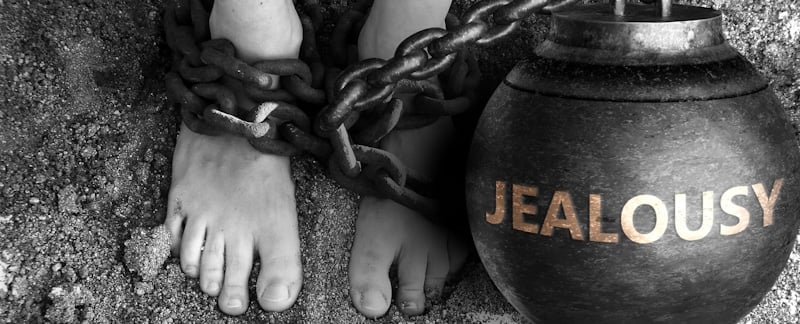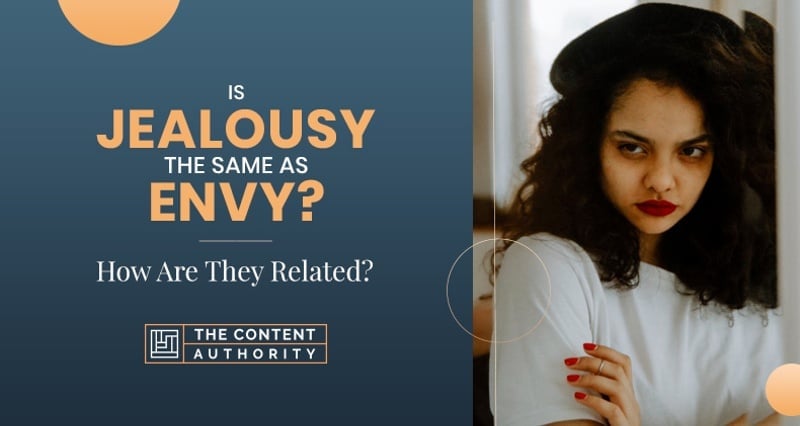Both jealousy and envy are good word choices that add color to your writing since they have the ability to capture your character’s feelings. However, whether you’re envious or jealous, the feeling definitely doesn’t make you feel warm and fuzzy inside. So what do these two words mean and are they interchangeable?
The ultimate difference between “envy” and “jealousy” is that “jealousy” is the emotion related to fear that something you have will be taken away by someone else, while “envy” is the emotion of coveting what someone else already has.
So if you thought that these two words are interchangeable, keep reading before you use either one of them in your texts again.

Jealousy – Definition
What does it mean to be jealous? Well, jealousy describes a feeling of insecurity or protectiveness you have over a rivalry or fear of being replaced. This consequently happens in a significant relationship and requires three people (you, the significant person, and another person).
So if someone flirts with your boyfriend, it produces jealousy. You will likely feel hurt, resentful and angry at that person who is flirting with someone you love. It may also result in feelings or a fear that that person may replace you.
Envy – Definition
Envy is more often than not confused with jealousy. However, while jealousy takes three parties to occur, envy only requires two. Envy is ultimately the longing you feel for something that someone else has. But, you could be envious of anything from a personality trait to a possession.
The Mix-Up Between Jealousy and Envy
You could ask 10 different people and you would probably get 10 different answers on how the emotions or feelings of envy and jealousy are distinct.
However, the truth is that there is a fairly straightforward distinction. Jealousy occurs when something we already possess is threatened by a third person. Envy occurs when we lack a desired attribute enjoyed by another.
So envy is a two-person situation whereas jealousy is a three-person situation. So jealousy is basically the reaction to the thought or threat of losing something or most often, someone. Envy is a reaction to lacking something.
So why the confusion?
One of the reasons for the mix-up is semantic ambiguity with the word “jealousy” but this does not exist with the word “envy”. So when asking people to describe a situation where they felt jealous, they would almost always describe an experience of being envious. So this naturally creates a sense that both envy and jealousy are very similar, even though they are actually two different emotions and definitely not interchangeable.
So when someone says, ” I’m feeling jealous,” you never know whether he or she is experiencing envy or jealousy, unless more context is provided or they elaborate.
The next issue that contributes to the confusion is that jealousy and envy often travel together. What kind of rival to your partner’s affections is likely to create jealousy? It is the rival with characteristics that you are likely to envy—that is, the attractive rival.
What this ultimately means is that when you are feeling jealous, you are most likely feeling envious as well.
Yet, jealousy and envy are two different emotions. As unpleasant as envy may be, it usually doesn’t contain a sense of betrayal and consequent outrage. In a nutshell, jealousy need not contain an acute sense of inferiority (provided the rival is not envious).
One thing is for certain and that is there is rarely a more intense, unpleasant brew than the reaction caused by seeing your loved one show interest in an enviable rival.

Distinguishing Between Jealousy and Envy
Lots of people are under the misconception that jealousy and envy are synonyms, yet they are two words with different meanings, so you see how this cannot be the case.
Envy has to do with wanting what someone else has and jealousy is the fear of losing what you already have to someone else. An example is when your new boss starts giving better-paying assignments to a new co-worker, which results in you worrying that your own job is in jeopardy.
These two emotions are quite a challenge to unravel. It is possible to feel unpleasant emotions about someone you know landing their dream job and claim that it’s because that person is boastful, and only realize they are feelings of envy later on.
We’re sure you’re asking yourself, what inspires these feelings of envy and jealousy? Well, it all boils down to how our brains are wired.
So from a neurologist’s perspective, it all depends on how the amygdala connects with areas of our brain that establish our values and our emotions. Neurologists are able to understand more of where anger, sadness, and fear originate, but jealousy and envy are complex in that the interplay between biochemistry, anatomy, and our environment within which we develop can dictate to what extent we feel either envy or jealousy.
Using “Envy” and “Jealousy” in Texts
As we mentioned earlier, jealousy is an emotion related to your possessions (and usually a person in a relationship). Envy, on the other hand, is an emotion related to someone else’s possessions.
Ultimately, the difference between envy and jealousy is linked to the possession or person being desired. Envy requires two people, while jealousy requires three people.
- Example: I’m filled with jealousy when you speak to my boyfriend. (three people).
- Example: I’m filled with envy over your new car. (two people)
The average joe may still use these two words interchangeably, but language purists know there is a distinction.
The noun “jealousy” describes a negative emotion caused by an attack on something we already have. Envy, on the other hand, is a negative emotion caused by wanting something owned by someone else.
- Example: I felt jealous when you danced with my husband.
- Example: I felt envious of her good looks.
Example Sentences with the Word “Jealousy”
- David soon became a popular hero and an object of jealousy to Saul.
- It was nothing but pure jealousy that guided his thoughts and feat of losing her.
- My mum always said that jealousy would destroy a marriage quicker than anything.
- The only thing jealousy does is make people miserable.
- Barbara’s jealousy reared its ugly head again.
- It wasn’t just because of her jealousy that he slept with everyone, it was also her insecurity.
- She felt jealousy stirring at the sight of her husband’s pretty secretary.
- Jealousy doesn’t become you.
- The jealousy that she felt over her sister was too deeply rooted.
- The jealousy of Catholic against Protestant, of the south against north, were deeply rooted.
- The old princess did not reply, but she was tormented by jealousy of her daughter’s happiness.
- On a positive note, Scorpio’s level of jealousy is equal to his level of devotion.
- His policy has aroused German jealousy.
- That stunt she pulled tonight was nothing short of jealousy.
- Why couldn’t you express your feelings for me in some other way besides jealousy?
- The mutual jealousy of the allies saved her.
Example Sentences with the Word “Envy”
- I envy her, but you want to make her what I am, without giving her my means.
- Why should I envy her?
- A lady entering the next cubicle shot a glance of feminine envy at Sarah.
- Bradly thanked him, a hint of envy in his voice, and he and Brian continued their trip to the hotel.
- When Denise enjoyed the spectacle of the exciting competition, she harbored no envy toward its participants.
- Her success, however, aroused the envy and suspicion of Domitian.
- These girls are supermodels, the envy of aspiring models and regular housewives alike.
- Denise and Algee, this is the dynamic power couple that others envy.
- Could it possibly top my beloved Lash envy?
- I think that’s the role that I would envy.
- Multiple belief systems suggest that fallen angels are the result of envy.
- Ah, you’re the envy of the women’s world.
- They were the envy of all those around them.
- He is living a life that has made him the envy of millions of people around the world.
- Don’t be surprised if you notice them looking at you with envy.
- It does not envy, it does not boast, itis not proud.
- Of course, I envy her.
- Spend wisely and soon your room will be the envy of everyone in the hall.
- Ego, jealousy, envy, and pride, why waste time on such trivialities?

Conclusion
Both envy and jealousy are two very unpleasant emotions. However, when it comes to expressing yourself, either in words or writing there’s an easy way to remember the difference between these two words. Envy is the emotion or feeling of wanting what someone else has, while jealousy is the emotion or fear of being replaced in the affection of someone you love or desire.
Shawn Manaher is the founder and CEO of The Content Authority. He’s one part content manager, one part writing ninja organizer, and two parts leader of top content creators. You don’t even want to know what he calls pancakes.

